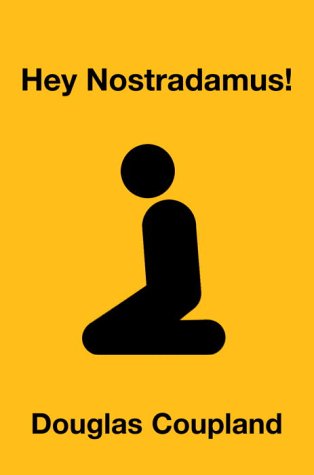Our book group choice for May 2004 is Hey Nostradamus! by Douglas Coupland. It tells the story of a fictional school shooting in suburban Vancouver, British Columbia in 1988. The novel is told in four parts, each with a different narrator and focus.
The first part of the novel is narrated by Cheryl Anway, a 17-year-old girl who is pregnant and secretly married to Jason Patric. Cheryl is a bright and sensitive girl, but she is also deeply troubled. She is struggling with her pregnancy, her relationship with Jason, and her own sense of identity.
The second part of the novel is narrated by Jason Patric, who is now 19 years old. Jason is still reeling from the death of Cheryl, who was one of the victims of the school shooting. He is withdrawn and emotionally numb, and he has difficulty connecting with other people.
The third part of the novel is narrated by Heather McHugh, a 32-year-old court stenographer. Heather is Jason’s girlfriend, and she is trying to help him heal from the trauma of the shooting. Heather is a kind and compassionate woman, but she is also struggling with her own demons.
The fourth and final part of the novel is narrated by Reg Patric, Jason’s father. Reg is a religious fanatic who believes that the school shooting was a punishment from God. He is cold and distant, and he has no empathy for Jason’s pain.
The novel explores the themes of grief, loss, and trauma. It also examines the ways in which people cope with tragedy. The novel is not afraid to tackle difficult subjects, but it does so with compassion and humor.
Discussion Questions
- Which of the four narrative voices (Cheryl, Jason, Heather and Reg) do you most easily identify with? Why? Are any of them difficult to identify with?
- How did you respond to Cheryl’s gradually unfolding revelation of what had happened?
- Identify some of the different ways that people respond to the shooting and the gunmen within the book. Why do you think people would respond in these kinds of ways?
- How does Coupland use Cheryl’s doodling of ‘God is nowhere God is now here’ to highlight some of the ways in which characters respond to the tragedy as a whole?
- What does Hey Nostradamus! say about the nature of faith and the place of religion? Is it positive or negative?
- What is your opinion of Youth Alive! the Christian group? Is this an accurate portrayal of a school Christian group?
- Why do you think Douglas Coupland uses the quotation from 1 Corinthians 15:51-52 at the beginning of the book? What is Coupland saying about hope and redemption in this novel? Are any of his characters redeemed? Ultimately, what forms does hope take in their lives?
- Does Hey Nostradamus! have any answers about suffering and the problem of evil, or does it just raise questions?
- At the end of Jason’s section, he reflects: ‘We’re all born lost aren’t we? We’re all born separated from God … and yet we’re all real: we have names, we have lives. We mean something. We must. My heart is so cold. And I feel so lost. How would you respond to someone expressing this kind of feeling? Is Jason right to believe that ‘we mean something’?
- What does Cheryl mean when she writes, ‘Even those of us who try to live a good and true life remain as far from grace as the Hillside Strangler or any demon who ever tried to poison the village well’ (page 3)? Do you think she is right? How else does Coupland present this view of humanity? What is a Christian perspective on human nature?
- Is there any redemption in this story? Is there any connection with the Christian view of redemption coming through Jesus Christ dying on a cross on our behalf? Why or why not?
- Discuss Cheryl’s description of the events in the cafeteria. Does her step-by-step account and her sense of calm make the actions of the young shooters seem more or less real? Is there immediacy here, or distance?
- Which of the novel’s four narrative voices did you connect with the most? Which the least?
- One reviewer has written that Cheryl is among the most “spiritually mature” characters in this novel. What do you think?
- How does the time span of the novel (about 15 years) affect your view of the characters, and the event that set this story in motion?
- Some reviewers have suggested that this is Douglas Coupland’s most spiritual book to date.
- Through his characters’ struggles with belief, is Douglas Coupland being supportive or critical of the Christian faith? Or a bit of both? Compare the different approaches to faith shown by the four main characters.
- Jason’s narrative exists in the form of an open letter to his brother Kent’s twin sons. Heather begins writing her story directly into official court transcripts at work. Reg posts thousands of copies of his narrative in the forest near Chilliwack. Discuss the importance of writing and correspondence in this novel. What might Coupland be saying about the act of writing in general, or about how we as a society deal with grief? Consider also the letters Jason receives from Cheryl’s family, the various letters to God that Cheryl begins composing in her head, and even the list that Jason leaves with the psychic.
- The title of this book comes from Jason’s reaction to his mother’s “Nostradamus kick” after the massacre, as she searches the astrologer’s prophecies for some sign of it (page 91). Do you think the title fits the book? Is Hey Nostradamus! a good title?
- Discuss how foreseeing the future might relate to this novel

